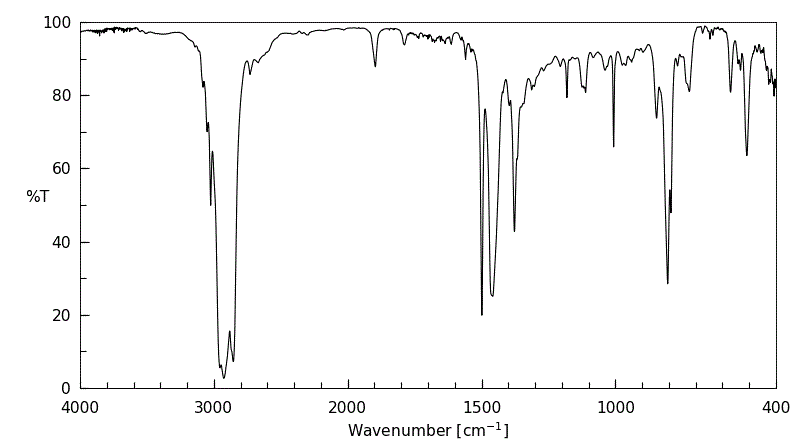4-甲基-4'-戊基-1,1'-联苯 | 64835-63-8
-
物化性质
-
计算性质
-
ADMET
-
安全信息
-
SDS
-
制备方法与用途
-
上下游信息
-
文献信息
-
表征谱图
-
同类化合物
-
相关功能分类
-
相关结构分类
物化性质
-
熔点:47.0 to 51.0 °C
-
沸点:350.5±22.0 °C(Predicted)
-
密度:0.940±0.06 g/cm3(Predicted)
-
最大波长(λmax):255nm(Cyclohexane)(lit.)
计算性质
-
辛醇/水分配系数(LogP):6.3
-
重原子数:18
-
可旋转键数:5
-
环数:2.0
-
sp3杂化的碳原子比例:0.33
-
拓扑面积:0
-
氢给体数:0
-
氢受体数:0
安全信息
-
海关编码:2902909090
-
危险性防范说明:P261,P264,P270,P271,P280,P301+P312,P302+P352,P304+P340,P305+P351+P338,P330,P332+P313,P337+P313,P362,P403+P233,P405,P501
-
危险性描述:H302,H315,H319,H335
制备方法与用途
应用4-甲基-4'-戊基-1,1'-联苯可用作有机合成中间体和医药中间体,在实验室研发和化工生产过程中广泛使用。
反应信息
-
作为产物:参考文献:名称:用于流通式交叉偶联反应的金属固定化甲基丙烯酸酯基整体柱的制备摘要:为了开发用于高通量有机合成的高效流通式微反应器,在这项工作中,通过将钯基、镍基、铁基和铜基催化剂化学固定在配体改性的聚(甲基丙烯酸缩水甘油酯-共-亚乙基二甲基丙烯酸酯)[聚(GMA-共-EDMA)]整料,其被一个silicosteel管内制备(10cm长为1.0毫米的内直径)和修饰具有若干配体,包括5-氨基1,10-菲咯啉 (APHEN)、亚氨基二乙酸 (IDA) 和亚氨基二甲基膦酸 (IDP)。对 Suzuki-Miyaura 交叉偶联反应中所得微反应器的性能进行了评估,发现聚(GMA- co-EDMA) 用 5-氨基-1,10-菲咯啉作为钯催化剂的结合位点进行化学改性的整料提供了出色的流通性能,能够以高产率实现高效和快速反应。此外,这种整体式微反应器在长期使用期间保持其良好的活性和效率。DOI:10.3390/molecules26237346
文献信息
-
Continuous‐Flow Suzuki‐Miyaura Coupling in Water and Organic Solvents Promoted by Blends of Stabilized Convoluted Polymeric Palladium Catalysts and Polymeric Auxiliary Materials作者:Zhenzhong Zhang、Aya Ohno、Hikaru Takaya、Yoichi M. A. YamadaDOI:10.1002/chem.202300494日期:2023.6.19
Abstract Given that heterogeneous palladium‐catalyzed C−C bond formation reactions under continuous‐flow conditions are well suited for the efficient and safe production of pharmaceuticals and functional materials, the development of active and durable catalysts for this purpose is a matter of high practical significance. Here, a previously established molecular convolution methodology was used to synthesize catalysts for Suzuki‐Miyaura coupling under flow conditions by blending convoluted polymeric palladium catalysts (prepared from copolymers of 4‐vinylpyridine and 4‐
tert ‐butylstyrene) and crosslinked polymeric auxiliary materials (prepared from copolymers of divinylbenzene and 4‐tert ‐butylstyrene). The optimal catalyst exhibited high performance and durability and allowed numerous biaryl products such as liquid‐crystalline materials, organic electroluminescent materials, and pharmaceuticals to be continuously synthesized with turnover frequencies of up to 238 h−1. In a demonstration of practical utility, the developed catalytic system was used for the continuous synthesis of two pharmaceuticals (felbinac and fenbufen) in water as the sole solvent.摘要鉴于连续流动条件下的异相钯催化 C-C 键形成反应非常适合于高效安全地生产药物和功能材料,为此开发活性持久的催化剂具有重要的现实意义。在此,我们采用之前建立的分子卷积方法,通过混合卷积聚合钯催化剂(由 4-乙烯基吡啶和 4-叔丁基苯乙烯的共聚物制备)和交联聚合辅助材料(由二乙烯基苯和 4-叔丁基苯乙烯的共聚物制备),合成了流动条件下的 Suzukii-Miyaura 偶联催化剂。最佳催化剂表现出高性能和耐久性,可连续合成多种生物芳基产品,如液晶材料、有机电致发光材料和药物,合成频率高达 238 h-1。在一次实用性演示中,所开发的催化系统被用于以水为唯一溶剂连续合成两种药物(非比萘酸和芬布芬)。
表征谱图
-
氢谱1HNMR
-
质谱MS
-
碳谱13CNMR
-
红外IR
-
拉曼Raman
-
峰位数据
-
峰位匹配
-
表征信息








